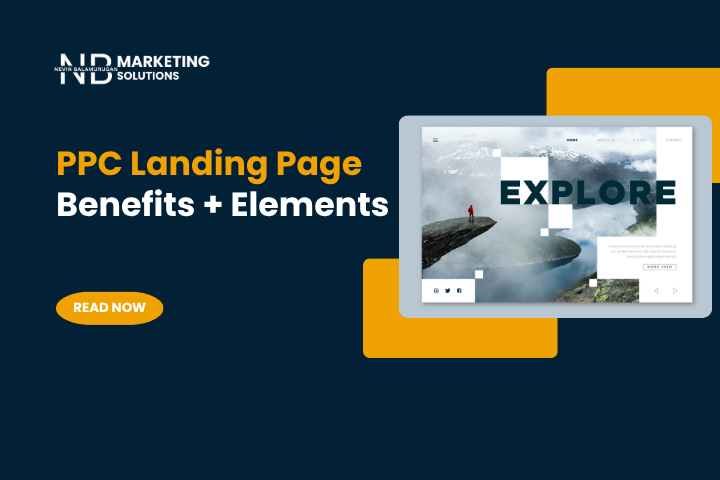What is a PPC Landing Page? (Benefits + Key Elements)
Abirami Dharmalingam
August 4, 2025

PPC Landing Page: A Complete Guide in 2025
Your good PPC landing page is your key chance to convert visitors into customers. That’s why you’re running a Google Ads campaign with compelling ad copy and ad strategy.
You want visitors to buy your product/service, sign up for a free trial, request a quote, or download a resource.
Want more leads or more sales?
You need a high-quality landing page to optimize your conversion rates. And more importantly, this lowers your conversion costs.
But if your visitors land on a poorly designed landing page, those ad clicks won’t work out. So, to make your customers stay, read, and follow your path – you need a well-optimized PPC landing page.
So stick with us, we’ll explore everything about PPC landing page – the elements that work, the difference between SEO vs PPC landing pages, and the benefits you get from PPC landing pages.

What is a PPC Landing Page?
PPC stands for Pay Per Click. A PPC landing page is a single web page where your visitors land after they click the link in your paid ads (Google Ads, Bing Ads, or Meta Ads). It offers content that is specific to what was advertised, provides additional information, builds trustworthiness, and encourages your customer to move towards the call to action (CTA).
No matter where your audience comes from, a good landing page can turn traffic into leads – turn visitors into customers. So, it helps you maximize every click, lower your cost-per-acquisition, and get better results from your ad spend.
PPC Landing Page vs SEO Landing Page: What is the Difference?
First, be clear, a landing page is a specific page where your visitors land. But, when it comes to PPC landing page vs. SEO landing page, there’s a big difference – purpose, strategy, and design.
Let’s break them down:
PPC Landing Page
PPC landing page attracts paid traffic where clicks come from Google Ads, Facebook Ads, LinkedIn Ads, etc. Here’s what sets them apart:
- Single and clear goal: These specific pages focus on one CTA to buy a product/service, sign up, fill out a form, or download a resource.
- No distractions: This keeps your customers focused only on converting – no navigation or external links provided to distract them.
- Matches your ad copy: Your landing page closely aligns with the ad copy and keyword intent, which helps to improve quality score and reduce cost-per-click.
- Highly targeted: Each landing page is tailored to specific campaigns, ad groups, or audience segments.

Image Credits: Asana
SEO Landing Page
On the other hand, SEO landing pages attract organic traffic from search engines like Google or Bing. Here’s what sets them apart:
- SEO-friendly page: These pages are optimized with keywords, headings, meta tags, and content that helps them rank in search results.
- More informative: Organic landing pages offer longer-form content to answer customer queries and satisfy search intent.
- Multiple goals: This may lead customers to explore other pages – they can explore other services, testimonials, blog sections, or others.
- Wider audience: These pages target wider search intent – more importantly, target top stages of the buyer’s journey.

Image Credits: Copy.ai
What are the benefits of a PPC landing page?
Here are some of the benefits of using perfect PPC landing pages for your business.
1) PPC landing page can increase your conversion rates
Clicks are not very valuable unless they lead to conversions. Driving visitors to take action (CTA) is a crucial task for PPC landing pages. Your goal can be anything – filling out a form, making a purchase, or requesting a call – whatever it may be, but it comes from a perfect landing page.
Unlike your homepage (which has menus and links), a PPC landing page strips away the noise and focuses the customer’s attention on one clear CTA. This leads to higher conversion rates. Moreover, distractions like navigation, unrelated links, and excess content are removed.
2) PPC landing page can improve your ad relevance
One of the key factors in determining your ad’s performance, particularly on platforms like Google Ads – ad relevance. When your landing page perfectly aligns with your ad copy (both in message and offer), you can significantly improve your quality score.
A higher Quality Score can lead to lower cost-per-click (CPC) and better ad placements – which means you get more value for your low budget.
3) PPC landing page can improve customer experience
Visitors who click on a PPC ad are typically looking for something specific – additional information about a product or service. A cluttered homepage or irrelevant page will only frustrate them. But a PPC landing page ensures that users find exactly what they’re looking for when they arrive.
This clear pathway provides a better customer experience – no distraction and no confusion – encourages users to stay on the page longer and complete the desired action.
4) PPC landing page target message for every audience
Not every visitor is the same. With organic pages, you can target a broad audience. But PPC landing pages are a little different. One of the biggest advantages of PPC landing pages is the ability to customize messaging for different audience segments, keywords, or ad groups.
For instance, if you’re:
Running multiple campaigns? or
Selling different products or services?
No problem.
Every landing page can be customized to align with the language, pain points, and intentions of your specific target group. Through personalized content, you can directly speak to your audience – and that relevance can significantly boost engagement and conversions.
So, you can increase your conversion because your message is aligned with the user’s expectation and search intent.
5) PPC landing page allows A/B testing for optimization
PPC landing pages focus on a single action, making them ideal for A/B testing different elements to discover what works best. You can test various elements such as headlines, images, layout, and the call-to-action (CTA) buttons. By analyzing how different versions perform, you can optimize your landing pages over time to improve conversion rates.

Major Elements Of A Perfect PPC Landing Page
While there is much to learn about landing pages, you should focus on these five key elements to create an effective PPC landing page.
Each of these elements has an important job to do – more importantly, convince the customer to take action.
1) Use strong visuals to grab attention
Think about it – what’s the first thing visitors notice when they land on your PPC landing page? Their eyes go straight to the visuals.
So, make sure they’re strong visuals that are relevant to:
What you’re offering.
The ad content and landing page content are similar.
And more ideally, your CTA wording.
But why? Because when visitors land on your PPC landing page, they need to feel like, “Yeah, I’m in the right place where I wanted to.” Place your hero image at the top of your landing page so it doesn’t make them scroll. And importantly, if you can align your image with your CTA – it can be even better.
2) Add Headline and Sub headline
Next, visitors will engage with the first line of your content – headline.
So, ask yourself:
Does your headline match your hero image?
Does it reflect the message from your ad?
Is your primary keyword added?
With all these, you can build trust to make visitors think they’re at the right place. And, importantly, add your subheader below your headline content. Here’s what your subheader should do:
- It needs to shift the tone from ad copy to action-focused content (CTA).
- It should include important keywords that didn’t fit in the headline.
- It needs to guide the visitors’ eye toward the next section.
3) Write clear and concise copy
Now that you’ve got their attention, it’s time to tell them what this offer exactly is. Here, you need to list out the features that truly show them the value. For this, write down your product or service features clearly and concisely.
Use bullet points, short paragraphs, and visuals to guide them smoothly down the page. More importantly, don’t just talk about what your product/service does. Talk about how it helps and make them visualize by using it.
Next, add the benefits and testimonials to evoke trust and build a connection with the visitors.
4) Create one CTA and repeat it
Your customer only needs to make one decision, and you need to draw their attention to that – call-to-action (CTA). Your CTA should be crystal clear, bold, and repeated throughout the page like a mantra.
Here’s how to make it work:
- Keep your CTA consistent – add them to the different sections.
- Place one near the top of the landing page for fast decision-makers who don’t need convincing.
- Then sprinkle it throughout the page, especially after key information or emotional triggers.
So, when everything on your PPC landing page supports that single action (CTA), conversions follow.
Create a Perfect PPC Landing Page Now To Convert Visitors Into Customers
In short, now you know that a well-optimized PPC landing page is essential for increasing the effectiveness of your PPC advertising campaign. With this, businesses can significantly increase conversion rates and drive valuable traffic to their sites.
The key elements, including a compelling headline and subheadline, visuals, captivating copy, and a clear call to action, allow marketers to capture customers’ attention and direct them toward specific actions.
Now you know why it is important to create and maintain a landing page. If you are not sure where to start, feel free to contact NB Marketing Solutions now to get a free consultation.
Recent Posts
Have Any Question?
- (+91) 938-542-1049
- info@nbmarketingsolutions.in
Categories
Make Appointment
Confused Over Choosing The Right Services For Your Business?
Tamil Nadu, India
- Near TMB Bank, Anjugramam post, Kanyakumari 629401
- info@nbmarketingsolutions.in
- (+91)93-8542-1049
